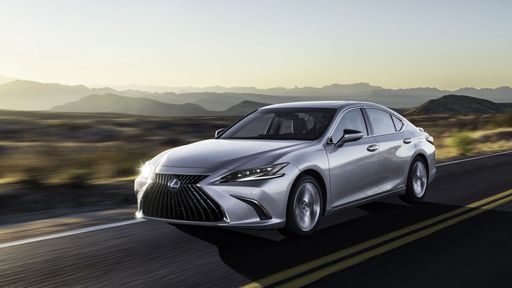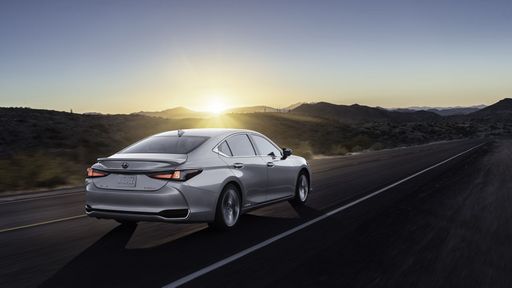Lexus ES vs Toyota Prius - Differences and prices compared
Compare performance (218 HP vs 223 HP), boot space and price (46600 £ vs 39400 £ ) at a glance. Find out which car is the better choice for you – Lexus ES or Toyota Prius?
Costs and Efficiency:
Price and efficiency are key factors when choosing a car – and this is often where the real differences emerge.
Toyota Prius has a to a small extent advantage in terms of price – it starts at 39400 £ , while the Lexus ES costs 46600 £ . That’s a price difference of around 7165 £.
Fuel consumption also shows a difference: Toyota Prius manages with 0.50 L and is therefore significantly more efficient than the Lexus ES with 5.10 L. The difference is about 4.60 L per 100 km.
Engine and Performance:
Power, torque and acceleration say a lot about how a car feels on the road. This is where you see which model delivers more driving dynamics.
When it comes to engine power, the Toyota Prius has a slight edge – offering 223 HP compared to 218 HP. That’s roughly 5 HP more horsepower.
In acceleration from 0 to 100 km/h, the Toyota Prius is distinct quicker – completing the sprint in 6.80 s, while the Lexus ES takes 8.90 s. That’s about 2.10 s faster.
In terms of top speed, the Lexus ES performs hardly perceptible better – reaching 180 km/h, while the Toyota Prius tops out at 177 km/h. The difference is around 3 km/h.
Space and Everyday Use:
Cabin size, boot volume and payload all play a role in everyday practicality. Here, comfort and flexibility make the difference.
Both vehicles offer seating for 5 people.
In curb weight, Toyota Prius is slight lighter – 1620 kg compared to 1680 kg. The difference is around 60 kg.
In terms of boot space, the Lexus ES offers clearly perceptible more room – 454 L compared to 284 L. That’s a difference of about 170 L.
When it comes to payload, Lexus ES evident takes the win – 470 kg compared to 375 kg. That’s a difference of about 95 kg.
Who wins the race in the data check?
The Toyota Prius is far ahead overall in the objective data comparison.
This result only shows which model scores more points on paper – not which of the two cars feels right for you.
Costs and Consumption
View detailed analysis
Engine and Performance
View detailed analysis
Dimensions and Body
View detailed analysis

Toyota Prius
Lexus ES
The Lexus ES delivers a supremely comfortable, quietly luxurious experience that favors serene cruising over sporting theatrics. It wraps everyday practicality, top-notch build quality and unimpeachable reliability in a handsome, grown-up package that will appeal to buyers who prize calm refinement over headline-grabbing excitement.
details


Toyota Prius
The Prius glides through traffic like a wise commuter's secret weapon, balancing miserly running costs with an unflappable sense of reliability. It's not a thrill seeker, but its roomy cabin, sensible packaging and low-stress driving personality make it a brilliant choice for buyers who value peace of mind over pulse-raising performance.
details



Costs and Consumption |
|
|---|---|
|
Price
46600 - 59300 £
|
Price
39400 - 45800 £
|
|
Consumption L/100km
5.10 L
|
Consumption L/100km
0.5 - 0.7 L
|
|
Consumption kWh/100km
-
|
Consumption kWh/100km
-
|
|
Electric Range
-
|
Electric Range
72 - 86 km
|
|
Battery Capacity
-
|
Battery Capacity
-
|
|
co2
115 g/km
|
co2
12 - 17 g/km
|
|
Fuel tank capacity
50 L
|
Fuel tank capacity
40 L
|
Dimensions and Body |
|
|---|---|
|
Body Type
Sedan
|
Body Type
Hatchback
|
|
Seats
5
|
Seats
5
|
|
Doors
4
|
Doors
5
|
|
Curb weight
1680 kg
|
Curb weight
1620 - 1630 kg
|
|
Trunk capacity
454 L
|
Trunk capacity
284 L
|
|
Length
4975 mm
|
Length
4599 mm
|
|
Width
1865 mm
|
Width
1782 mm
|
|
Height
1445 mm
|
Height
1470 mm
|
|
Max trunk capacity
-
|
Max trunk capacity
-
|
|
Payload
470 kg
|
Payload
365 - 375 kg
|
Engine and Performance |
|
|---|---|
|
Engine Type
Full Hybrid
|
Engine Type
Plugin Hybrid
|
|
Transmission
Automatic
|
Transmission
Automatic
|
|
Transmission Detail
CVT
|
Transmission Detail
CVT
|
|
Drive Type
Front-Wheel Drive
|
Drive Type
Front-Wheel Drive
|
|
Power HP
218 HP
|
Power HP
223 HP
|
|
Acceleration 0-100km/h
8.90 s
|
Acceleration 0-100km/h
6.80 s
|
|
Max Speed
180 km/h
|
Max Speed
177 km/h
|
|
Torque
-
|
Torque
-
|
|
Number of Cylinders
4
|
Number of Cylinders
4
|
|
Power kW
160 kW
|
Power kW
164 kW
|
|
Engine capacity
2487 cm3
|
Engine capacity
1998 cm3
|
General |
|
|---|---|
|
Model Year
2024
|
Model Year
2023
|
|
CO2 Efficiency Class
C
|
CO2 Efficiency Class
B
|
|
Brand
Lexus
|
Brand
Toyota
|
Is the Lexus ES offered with different drivetrains?
The Lexus ES is offered with Front-Wheel Drive.




